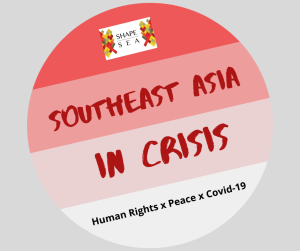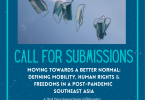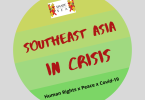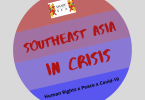Written by: Dominique Virgil
Dominique Virgil is a recent law graduate from University of Indonesia, majoring in Public International Law. She is currently a Researcher in Amnesty International. This piece strictly represents author ™s personal view, not any institution or organization. Dominique can be reached through her e-mail: dominique.tuapetel@gmail.com COVID-19 outbreak in January 2020 used to be seen as an insignificant threat, given its low fatality rate compared to the 2002-2003 SARS outbreak. Originating from China, this virus has infected thousands of people in more than 194 countries around the world (World Meters, 2020). The world has grown more weary due to the horror that this pandemic has caused in Italy, whose deaths have exceeded the number in China (Quinn, 2020).Indonesia was among the last countries, especially in Southeast Asia, which detected its first positive case of COVID-19 infection. Its inaugural announcement was made by President Joko Widodo on 2 March, directly caused wide-spread panic buying among Jakartans. Not long after that, the cases have been increasing exponentially, reaching 686 cases with 55 deaths as per Tuesday, making this the highest fatality rate in the world (The Jakarta Post, 2020). Indonesia is now struggling to reduce the acceleration of infection among its people: from opening up buildings as temporary hospitals, buying medicines and needed medical utilities from China, until planning the cash transfers for vulnerable workers only in a span of less than 2 weeks.It is left for us to wonder: have the Government of Indonesia conducted adequate precautions to increase national preparedness to face this pandemic? Have the Government of Indonesia learned from the fatality of this pandemic from other countries? What are the impacts of this action towards human rights?Controversial statements from the stakeholders are the benchmark to assess Indonesia ™s preparedness to face this pandemic. First is the statement from the Health Minister, Terawan Agus, depicting Indonesia as immune to the virus. Another ignorant move by the Government on the gravity of this pandemic is also shown by the Health Minister ™s statement, claiming that the study conducted by Marc Lipsitch, a Harvard Professor, was an insult to the country and its ability to handle the virus (The Jakarta Post, 2020).The issuance of social-distancing was uttered by President Joko Widodo only when the cases have reached 117 on 15 March (CNBC Indonesia, 2020). This excludes the possibility of undetected cases in Indonesia, especially in the Greater Jakarta Area where enormous amount of people commute by public transportation everyday. This was only issued after the letter from the Director General of World Health Organization gained public attention, urging the President to ˜scale up the country ™s emergency response mechanism ™ (The Jakarta Post, 2020). The decision to conduct rapid test was only publicly announced exactly three weeks after the first finding of COVID-19 case in Indonesia (BBC Indonesia, 2020). This action is deemed as too late by some, since the number keeps growing exponentially and that not everyone in Indonesia is able to implement working from home and social distancing policies, such as casual daily workers.The high importance of the fulfilment of the right to health has gained international acknowledgment as it has been enshrined in Article 12 of the International Covenant on Economic, Social, and Cultural Rights (ICESCR). Included in this right is the right to prevention, treatment, and control of diseases as well as the right to access equal and timely access to basic preventive health services and education, as regulated in paragraph 16 and 17 of General Comment No. 14 of 2000. This entails the States ™ obligation to fulfill in a form of ensuring the provision of health care, including programmes against major infectious disease. On the other hand, General Comment No. 3 of the UN Committee on Economic, Social and Cultural Rights (ESCR Committee) also explains in concrete that States have the obligation to take all appropriate measures, including but not limited to legislative measures towards the realization of the rights within ICESCR, which includes the right to health as previously mentioned.In a bigger picture, States have the obligation to act with due diligence , meaning that States have to take all appropriate measures to ensure the fulfillment of human rights, emphasizing the need to take prudent steps to avoid a range of bad outcomes which may constitute as a violation to the rule of international law (McDonald, 2019). In this context, the Government of Indonesia has the obligation to mitigate the risks to prevent violation against the right to health in COVID-19 pandemic. As previously mentioned, the delay of the Government in initiating steps to mitigate the risks of COVID-19 pandemic within its territory has caused a violation to the right to health of its citizens, while also failing to slow down the infection rate in the country.Given the vast increase of infection rate in Indonesia, the lack of preparedness from the government measured by the number of infrastructure and health workers, the impact of this virus has grown so severe. Indonesia needs to learn from Singapore, whose preparedness has gained worldwide compliments and appreciation after it is revealed that Singapore has ˜invested heavily in outbreak preparation and building up the public health preparedness clinics after the SARS outbreak in 2003, including its transparent public health communication (Hsu & Tan, 2020). Despite the progress made in the past one week, the Government of Indonesia is still in urgent need to determine and implement a more effective strategy to fulfill the right to health of the people within its territory.BibliographyBBC Indonesia. (2020, March 20). Virus corona: Antara 600.000 hingga 700.000 ‘berisiko terpapar’, pemerintah Indonesia lakukan rapid test. Cited March 25, 2020CNBC Indonesia. (2020, March 16). Corona di RI: Kasus 117 Orang, Jokowi Imbau Bekerja di Rumah. Cited March 25, 2020Hsu, L. Y., & Tan, M.-H. (2020, March 23). What Singapore can teach the U.S. about responding to Covid-19. Retrieved from StatNews:McDonald, N. (2019, October). The Role of Due Diligence in International Law. International and Comparative Law Quarterly.Quinn, C. (2020, March 20). Italy ™s Coronavirus Death Toll Surpasses China ™s. Retrieved from Foreign Policy.The Jakarta Post. (2020, February 15). ˜It’s meant to help ™: Harvard professor responds after government dismisses study on undetected coronavirus cases. Jakarta. Cited March 25, 2020The Jakarta Post. (2020, March 14). COVID-19: WHO urges Jokowi to declare national emergency. Cited March 25, 2020The Jakarta Post. (2020, March 24). Indonesia’s Latest COVID-19 Figures. Jakarta, Indonesia. Cited March 25, 2020World Meters. (2020, March 25). COVID-19 Coronavirus Pandemic. Cited March 25, 2020
COVID-19 outbreak in January 2020 used to be seen as an insignificant threat, given its low fatality rate compared to the 2002-2003 SARS outbreak. Originating from China, this virus has infected thousands of people in more than 194 countries around the world (World Meters, 2020). The world has grown more weary due to the horror that this pandemic has caused in Italy, whose deaths have exceeded the number in China (Quinn, 2020).Indonesia was among the last countries, especially in Southeast Asia, which detected its first positive case of COVID-19 infection. Its inaugural announcement was made by President Joko Widodo on 2 March, directly caused wide-spread panic buying among Jakartans. Not long after that, the cases have been increasing exponentially, reaching 686 cases with 55 deaths as per Tuesday, making this the highest fatality rate in the world (The Jakarta Post, 2020). Indonesia is now struggling to reduce the acceleration of infection among its people: from opening up buildings as temporary hospitals, buying medicines and needed medical utilities from China, until planning the cash transfers for vulnerable workers only in a span of less than 2 weeks.It is left for us to wonder: have the Government of Indonesia conducted adequate precautions to increase national preparedness to face this pandemic? Have the Government of Indonesia learned from the fatality of this pandemic from other countries? What are the impacts of this action towards human rights?Controversial statements from the stakeholders are the benchmark to assess Indonesia ™s preparedness to face this pandemic. First is the statement from the Health Minister, Terawan Agus, depicting Indonesia as immune to the virus. Another ignorant move by the Government on the gravity of this pandemic is also shown by the Health Minister ™s statement, claiming that the study conducted by Marc Lipsitch, a Harvard Professor, was an insult to the country and its ability to handle the virus (The Jakarta Post, 2020).The issuance of social-distancing was uttered by President Joko Widodo only when the cases have reached 117 on 15 March (CNBC Indonesia, 2020). This excludes the possibility of undetected cases in Indonesia, especially in the Greater Jakarta Area where enormous amount of people commute by public transportation everyday. This was only issued after the letter from the Director General of World Health Organization gained public attention, urging the President to ˜scale up the country ™s emergency response mechanism ™ (The Jakarta Post, 2020). The decision to conduct rapid test was only publicly announced exactly three weeks after the first finding of COVID-19 case in Indonesia (BBC Indonesia, 2020). This action is deemed as too late by some, since the number keeps growing exponentially and that not everyone in Indonesia is able to implement working from home and social distancing policies, such as casual daily workers.The high importance of the fulfilment of the right to health has gained international acknowledgment as it has been enshrined in Article 12 of the International Covenant on Economic, Social, and Cultural Rights (ICESCR). Included in this right is the right to prevention, treatment, and control of diseases as well as the right to access equal and timely access to basic preventive health services and education, as regulated in paragraph 16 and 17 of General Comment No. 14 of 2000. This entails the States ™ obligation to fulfill in a form of ensuring the provision of health care, including programmes against major infectious disease. On the other hand, General Comment No. 3 of the UN Committee on Economic, Social and Cultural Rights (ESCR Committee) also explains in concrete that States have the obligation to take all appropriate measures, including but not limited to legislative measures towards the realization of the rights within ICESCR, which includes the right to health as previously mentioned.In a bigger picture, States have the obligation to act with due diligence , meaning that States have to take all appropriate measures to ensure the fulfillment of human rights, emphasizing the need to take prudent steps to avoid a range of bad outcomes which may constitute as a violation to the rule of international law (McDonald, 2019). In this context, the Government of Indonesia has the obligation to mitigate the risks to prevent violation against the right to health in COVID-19 pandemic. As previously mentioned, the delay of the Government in initiating steps to mitigate the risks of COVID-19 pandemic within its territory has caused a violation to the right to health of its citizens, while also failing to slow down the infection rate in the country.Given the vast increase of infection rate in Indonesia, the lack of preparedness from the government measured by the number of infrastructure and health workers, the impact of this virus has grown so severe. Indonesia needs to learn from Singapore, whose preparedness has gained worldwide compliments and appreciation after it is revealed that Singapore has ˜invested heavily in outbreak preparation and building up the public health preparedness clinics after the SARS outbreak in 2003, including its transparent public health communication (Hsu & Tan, 2020). Despite the progress made in the past one week, the Government of Indonesia is still in urgent need to determine and implement a more effective strategy to fulfill the right to health of the people within its territory.BibliographyBBC Indonesia. (2020, March 20). Virus corona: Antara 600.000 hingga 700.000 ‘berisiko terpapar’, pemerintah Indonesia lakukan rapid test. Cited March 25, 2020CNBC Indonesia. (2020, March 16). Corona di RI: Kasus 117 Orang, Jokowi Imbau Bekerja di Rumah. Cited March 25, 2020Hsu, L. Y., & Tan, M.-H. (2020, March 23). What Singapore can teach the U.S. about responding to Covid-19. Retrieved from StatNews:McDonald, N. (2019, October). The Role of Due Diligence in International Law. International and Comparative Law Quarterly.Quinn, C. (2020, March 20). Italy ™s Coronavirus Death Toll Surpasses China ™s. Retrieved from Foreign Policy.The Jakarta Post. (2020, February 15). ˜It’s meant to help ™: Harvard professor responds after government dismisses study on undetected coronavirus cases. Jakarta. Cited March 25, 2020The Jakarta Post. (2020, March 14). COVID-19: WHO urges Jokowi to declare national emergency. Cited March 25, 2020The Jakarta Post. (2020, March 24). Indonesia’s Latest COVID-19 Figures. Jakarta, Indonesia. Cited March 25, 2020World Meters. (2020, March 25). COVID-19 Coronavirus Pandemic. Cited March 25, 2020





